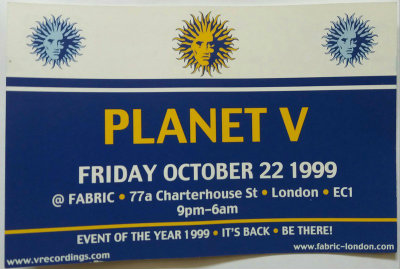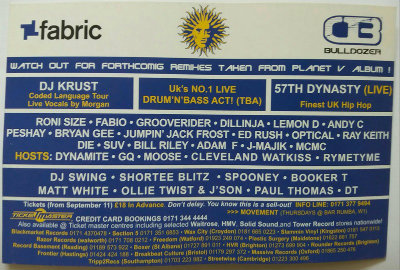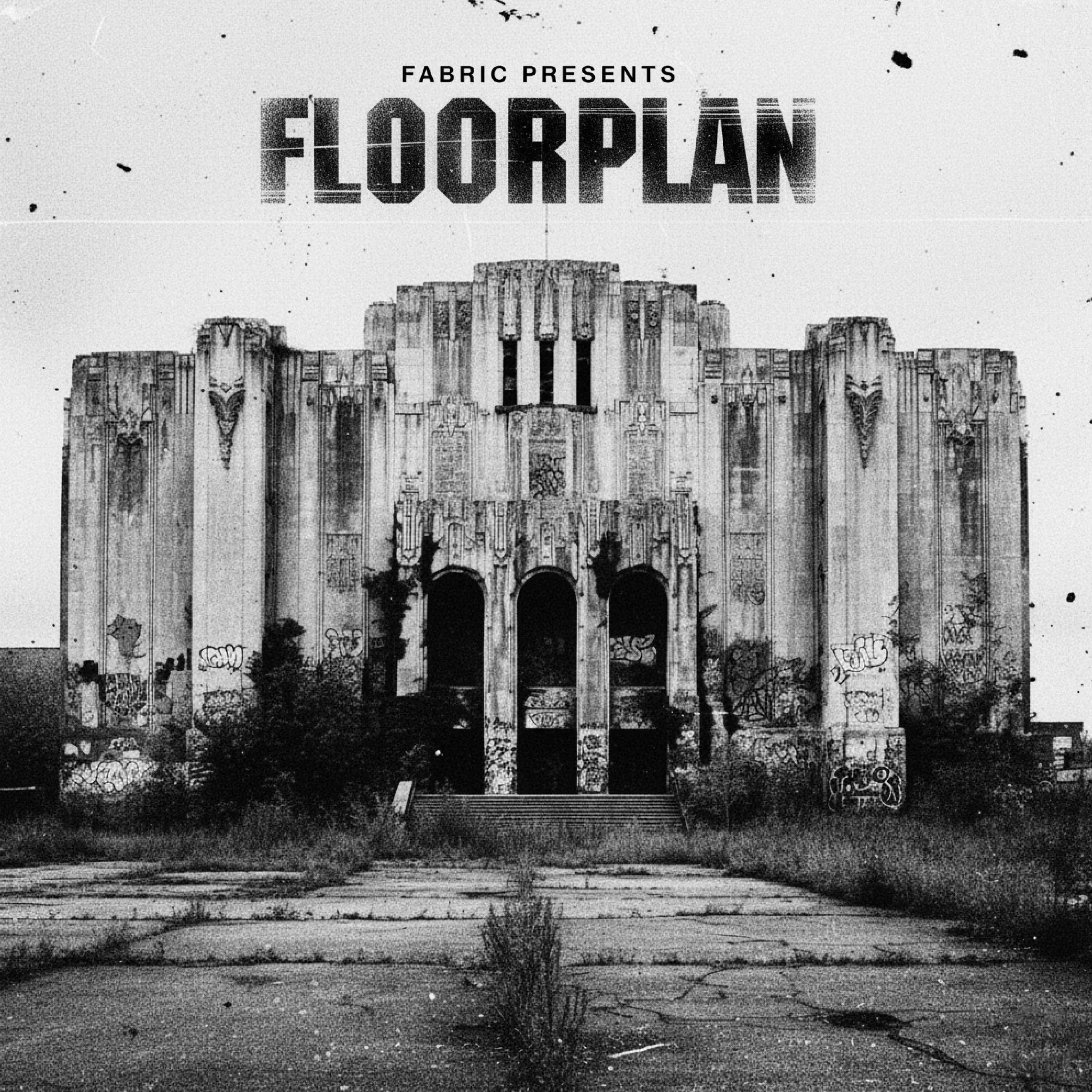News
In Conversation: Roni Size Reflects On A Lifetime Of Achievement
 When Reprazent’s New Forms LP won the Mercury Prize in 1997, the group were heralded as drum & bass pioneers as the sound gained recognition on a global level. The man at the centre of this was Roni Size (birth name Ryan Owen Granville Williams), the group’s frontman who became a poster boy for the genre across the world.
Williams grew up surrounded by the sound system culture of Bristol’s Jamaican communities, and his debut record was a definitive moment in taking the sound out wide and reaching out to new, bigger audience. Through his 20-year career he has been one of the drum & bass community’s key visionaries, and with Full Cycle – the label he co-founded with Krust – was integral to pushing the scene forward.
Ahead of his appearance at FABRICLIVE on 23rd June, we recently caught up with the absolute pioneer on the phone. Speaking one week after the tragic death of his friend and fellow musical innovator Marcus Intalex, Williams was in a particularly poignant mood as we looked back on his musical achievements.
“I remember the first time I met him, he was part of a duo called Da Intalex.” he recalled pensively. “It was when we were both cutting records at Music House in London. Back in the day, the scene was a bit cliquey – everyone was getting to know each other, hanging out and sharing music, and it’s good now to just sit back and reminisce.”
Sitting on the other end of the line, it was easy to see why Size had brought up the late artist. Marcus Intalex was, in many ways, one of drum & bass’s most important figures. His records were equal parts rich and soulful, earning universal acclaim as some of the genre’s very best.
With dubplate culture in rude health in the late 90s, Music House became a key meeting point for drum & bass artists like Size and Intalex to cut records and exchange ideas on their music. Size remembers visiting the store ahead of his appearance at our opening night in October 1999. “I’d been in New York the night before, where I’d made a record. I went to Music House, had it cut, and then played it that same night. That must be the longest journey I’ve ever made to cut a dubplate.”
When Reprazent’s New Forms LP won the Mercury Prize in 1997, the group were heralded as drum & bass pioneers as the sound gained recognition on a global level. The man at the centre of this was Roni Size (birth name Ryan Owen Granville Williams), the group’s frontman who became a poster boy for the genre across the world.
Williams grew up surrounded by the sound system culture of Bristol’s Jamaican communities, and his debut record was a definitive moment in taking the sound out wide and reaching out to new, bigger audience. Through his 20-year career he has been one of the drum & bass community’s key visionaries, and with Full Cycle – the label he co-founded with Krust – was integral to pushing the scene forward.
Ahead of his appearance at FABRICLIVE on 23rd June, we recently caught up with the absolute pioneer on the phone. Speaking one week after the tragic death of his friend and fellow musical innovator Marcus Intalex, Williams was in a particularly poignant mood as we looked back on his musical achievements.
“I remember the first time I met him, he was part of a duo called Da Intalex.” he recalled pensively. “It was when we were both cutting records at Music House in London. Back in the day, the scene was a bit cliquey – everyone was getting to know each other, hanging out and sharing music, and it’s good now to just sit back and reminisce.”
Sitting on the other end of the line, it was easy to see why Size had brought up the late artist. Marcus Intalex was, in many ways, one of drum & bass’s most important figures. His records were equal parts rich and soulful, earning universal acclaim as some of the genre’s very best.
With dubplate culture in rude health in the late 90s, Music House became a key meeting point for drum & bass artists like Size and Intalex to cut records and exchange ideas on their music. Size remembers visiting the store ahead of his appearance at our opening night in October 1999. “I’d been in New York the night before, where I’d made a record. I went to Music House, had it cut, and then played it that same night. That must be the longest journey I’ve ever made to cut a dubplate.”

 The flyer from our opening night, October 1999
From our very first opening night, Size has played a significant part in our history. On the one hand his influence speaks for itself: throughout the last 17 years, he’s made countless appearances with us in our Friday night sessions. But there’s also a less obvious side to the coin: after he won the Mercury Prize, he was arguably the first person to bring the sound across several continents. He believes the scene’s strong sense of community has helped with its lasting appeal.
“It’s a style of music that’s always had a great passion for the technology, how we look at the music and how far it’s travelled.” he pondered. “You can go to Japan and all be in the same room together – you might not all speak the same language but everyone dances to the same rhythm. That’s the secret to it. The music is evolving all the time, I think we take influence from all dance music. You can play drum & bass with influence from techno, reggae or hip hop. Above all, it’s the tempo that defines my music.”
As much as he helped his sound travel, Size has always kept firm roots to his Bristol hometown. He was one of the key figures that helped give the city its strong musical edge today. “We did a lot of nights in Bristol.” he explained. “We used to do a night called Full Cycle Sundays at The Level – it was a great way to break new music. There were plenty of other clubs: Lakota, Trinity Centre, as well as all the smaller local ones. I’ve also been going to Glastonbury since I was around 12 – in the West Country we always had a lot of festivals and free parties.”
It’s almost ironic looking back on it now: an artist from the heart of the city’s underground scene becoming a world-renowned pioneer for a fully-fledged genre. How does he look back on the success of New Forms after 20 years?
“It was at a time when maybe I thought we didn’t deserve the award as we didn’t have much self-belief.” He confesses. “But looking back, I think I’ve done myself justice, I’ve stayed true to who I am, and I think the music has remained close to my heart.”
We’re glad it did.
The flyer from our opening night, October 1999
From our very first opening night, Size has played a significant part in our history. On the one hand his influence speaks for itself: throughout the last 17 years, he’s made countless appearances with us in our Friday night sessions. But there’s also a less obvious side to the coin: after he won the Mercury Prize, he was arguably the first person to bring the sound across several continents. He believes the scene’s strong sense of community has helped with its lasting appeal.
“It’s a style of music that’s always had a great passion for the technology, how we look at the music and how far it’s travelled.” he pondered. “You can go to Japan and all be in the same room together – you might not all speak the same language but everyone dances to the same rhythm. That’s the secret to it. The music is evolving all the time, I think we take influence from all dance music. You can play drum & bass with influence from techno, reggae or hip hop. Above all, it’s the tempo that defines my music.”
As much as he helped his sound travel, Size has always kept firm roots to his Bristol hometown. He was one of the key figures that helped give the city its strong musical edge today. “We did a lot of nights in Bristol.” he explained. “We used to do a night called Full Cycle Sundays at The Level – it was a great way to break new music. There were plenty of other clubs: Lakota, Trinity Centre, as well as all the smaller local ones. I’ve also been going to Glastonbury since I was around 12 – in the West Country we always had a lot of festivals and free parties.”
It’s almost ironic looking back on it now: an artist from the heart of the city’s underground scene becoming a world-renowned pioneer for a fully-fledged genre. How does he look back on the success of New Forms after 20 years?
“It was at a time when maybe I thought we didn’t deserve the award as we didn’t have much self-belief.” He confesses. “But looking back, I think I’ve done myself justice, I’ve stayed true to who I am, and I think the music has remained close to my heart.”
We’re glad it did.Tags
No items found.




